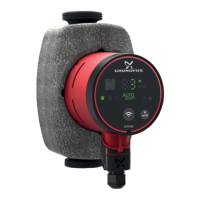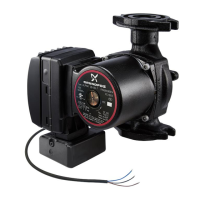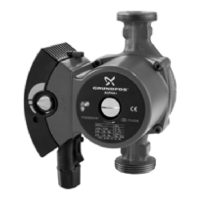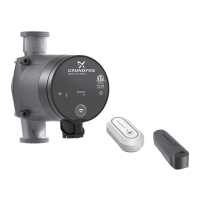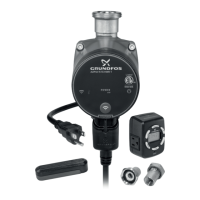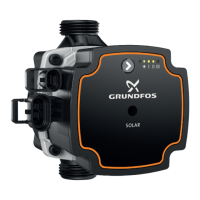English (GB)
14
7.2 Display
The display (1) is on when you have switched on the power
supply.
The display shows the actual pump power consumption in watt or
the actual flow rate in m
3
/h in steps of 0.1 m
3
/h during operation.
Faults preventing the pump from operating properly, for example
a blocked rotor, are indicated in the display by fault codes. See
section 9. Fault finding the product.
If a fault is indicated, correct the fault and reset the pump by
switching the power supply off and on.
If the pump impeller is rotated, for example when filling the pump
with water, sufficient energy can be generated to light up the
display even if the power supply has been switched off.
7.3 Light fields indicating the pump setting
The pump has ten performance settings which you can select
with the button (5). See fig. 19.
The pump setting is indicated by nine light fields in the display.
See fig. 20.
Fig. 20 Nine light fields
For information about the function of the settings, see section
7.7 Control modes.
7.4 Light field indicating the status of automatic night
setback
Light in shows that automatic night setback is active. See fig.
19, pos. 3. See also section 7.5 Button for enabling or disabling
of automatic night setback.
7.5 Button for enabling or disabling of automatic night
setback
The button enables and disables automatic night setback. See
fig. 19, pos. 4.
Automatic night setback is only relevant for heating systems
prepared for this function. See section 9. Fault finding the
product.
The light field is on when automatic night setback is
active. See fig. 19, pos. 3.
Factory setting: automatic night setback is not active.
If you have set the pump to speed I, II or III, you cannot select
automatic night setback.
7.6 Button for selection of pump setting
Every time you press the button , the pump setting is changed.
See fig. 19, pos. 5.
A cycle is ten button presses. See section 7.3 Light fields
indicating the pump setting.
TM05 3061 0912
Button
presses
Active light fields Description
0
factory setting
AUTO
ADAPT
1
Lowest
proportional-pressure
curve, PP1
2
Intermediate
proportional-pressure
curve, PP2
3
Highest
proportional-pressure
curve, PP3
4
Lowest
constant-pressure curve,
CP1
5
Intermediate
constant-pressure curve,
CP2
6
Highest
constant-pressure curve,
CP3
7
Constant curve/constant
speed III
8
Constant curve/constant
speed II
9
Constant curve/constant
speed I
10
AUTO
ADAPT

